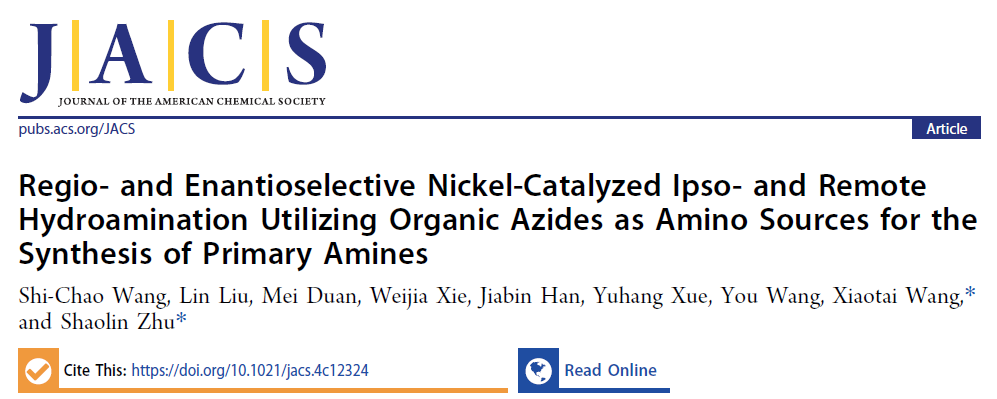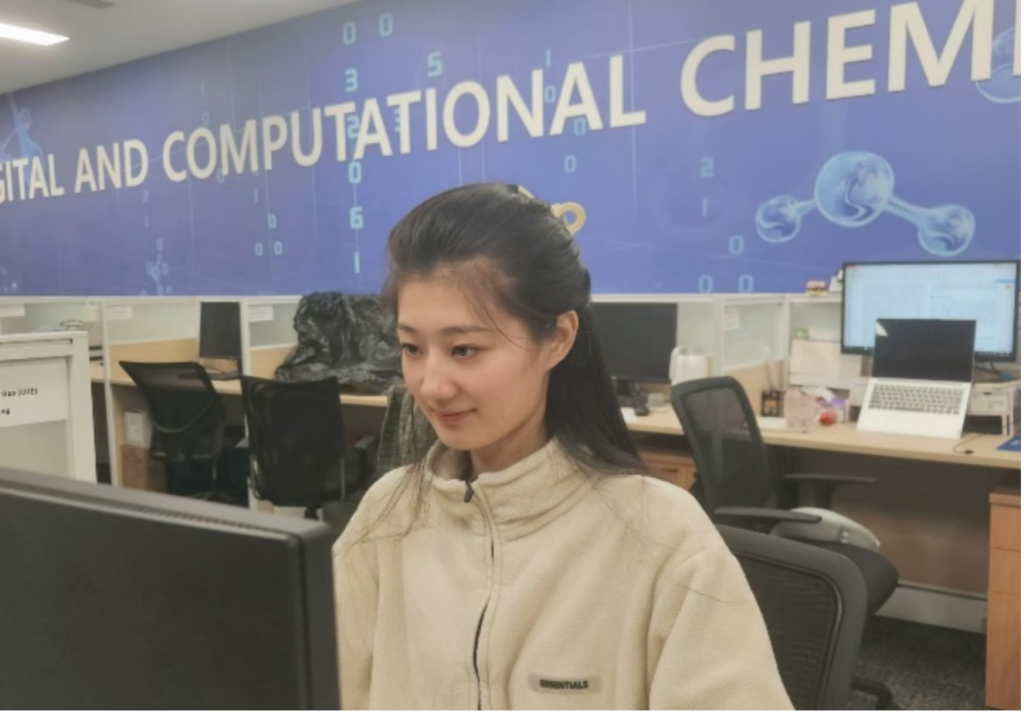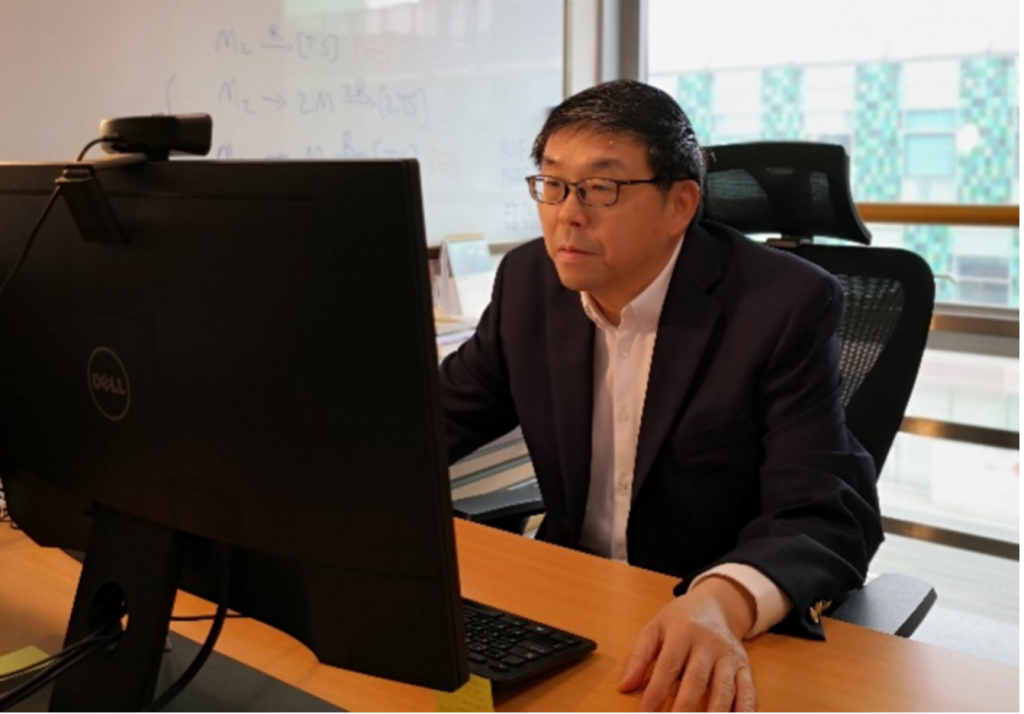05 Nov 2024
Recently, the research group of Professor Xiaotai Wang from the Department of Chemistry, School of Science, Xi'an Jiaotong-Liverpool University and the research group of Professor Shaolin Zhu from the School of Chemistry and Chemical Engineering of Nanjing University collaboratively published an important research paper titled "Regio- and Enantioselective Nickel-Catalyzed Ipso- and Remote Hydroamination Utilizing Organic Azides as Amino Sources for the Synthesis of Primary Amines" in the world's top chemistry journal Journal of the American Chemical Society (JACS) (10.1021/jacs.4c12324). Lin Liu, a PhD student in the Department of Chemistry, School of Science is the second author of the paper, and Professor Xiaotai Wang is the co-corresponding author.

“There has been intense interest in sustainable catalysis using Earth-abundant metals such as nickel (Ni). Due to its low cost and unique properties, nickel catalysts have the potential to replace palladium-based catalysts and find widespread applications in the production of medicines, new materials, and fine chemicals.” Professor Wang says. This JACS article reports a cutting-edge discovery: a nickel-catalyzed mild hydroamination reaction that utilizes organic azides as amine sources. This method offers a highly efficient way of constructing α-chiral branched primary amines, as well as linear primary amines. It is anticipated to find extensive application in organic synthesis.
Professor Wang has focused on the mechanism of Ni catalysis in recent years, publishing numerous excellent papers on the topic in major chemistry journals. Under the guidance of Professor Wang, Lin Liu used density functional theory (DFT) computational methods to deeply explore the mechanism of this nickel-catalyzed reaction. She successfully revealed that the stereoselectivity and chemical selectivity of the reaction originate from the key step of the migration of the olefin substrate into the carbon-carbon double bond. In addition, she found that the key step controlling the overall reaction rate is the carbon-nitrogen reductive elimination and coupling. “It is particularly worth mentioning that Lin Liu's computational modeling work for the first time elucidated the process of two-electron redox reaction between organic azide compounds and low-valent nickel compounds, providing valuable theoretical guidance for the further development of such reactions.” Professor Wang explains.

PhD student Lin Liu:
After obtaining a Master’s degree in Chemistry from Shandong University in 2023, Lin Liu entered XJTLU to pursue a PhD degree under the mentorship of Professor Xiaotai Wang. During her Master’s studies, she focused on the catalytic reaction mechanisms of the precious metal palladium. Upon arriving at XJTLU, she embraced new challenges and shifted her focus to studying the catalytic reaction mechanisms of Earth-abundant metals such as nickel and cobalt. At XJTLU and the School of Science, Lin Liu has experienced a strong academic atmosphere and a cutting-edge research environment. With robust institutional support and the meticulous guidance from Professor Wang, her PhD supervisor, she has made significant progress over the past year. Her ability to think independently and solve problems has been greatly enhanced. Lin Liu believes that through persistent efforts, she can achieve more breakthroughs and obtain further important results in the field of computational catalysis.

Professor Xiaotai Wang
Xiaotai Wang received his undergraduate and Master’s education in China. Afterwards he won a full scholarship from the University of Virginia, which brought him to the USA to pursue a PhD in Chemistry. This was followed by two short postdocs at the University of Utah and Iowa State University. His PhD and postdoc work were focused on the synthesis and reactivity of organometallic compounds. Once he started his independent academic/research career in the USA, Professor Wang studied the synthesis and properties of a class of advanced materials known as metal-organic frameworks (MOFs). Professor Wang’s current research interests are in computational organometallic chemistry, with a focus on studying the mechanisms of transition metal-catalyzed synthetically useful reactions. Research in this exciting direction addresses the experimental-theoretical synergy and provides ideas and insights for new reaction development. Professor Xiaotai Wang joined the School of Science and Xian Jiaotong-Liverpool University (XJTLU) as a Professor of Chemistry in November 2022. He had previously worked at the University of Colorado Denver, USA moving up the ranks of Assistant Professor, Associate Professor (tenured), and Professor (tenured). He was a visiting professor/scholar at MIT, the Chinese Academy of Sciences, and the Hoffmann Institute in Shenzhen. Professor Wang is actively recruiting bright and dedicated (UG, PG and PhD) students to join his research team, If you are interested please feel free to contact her at:Xiaotai.Wang@xjtlu.edu.cn
Photos and material:Professor Xiaotai Wang
05 Nov 2024








